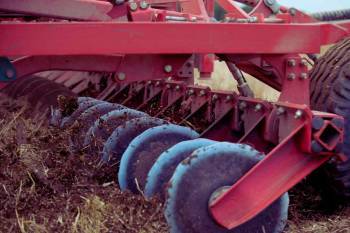Sub-Mission on Agricultural Mechanization, NAMO DRONE DIDI, and Digital Agriculture Mission at the Forefront
NEW DELHI, 17 April 2025: The Indian government is actively promoting the adoption of new technologies in agriculture through various centrally sponsored schemes and missions, aiming to empower farmers, enhance productivity, and ensure sustainable farming practices.
This was highlighted in a recent statement by the Minister of State for Agriculture and Farmers’ Welfare, Shri Ramnath Thakur, in a written reply to the Rajya Sabha.
A key initiative in this direction is the ‘Sub-Mission on Agricultural Mechanization’ (SMAM), a crucial component of the Rashtriya Krishi Vikas Yojana (RKVY). Implemented through State Governments, SMAM provides financial assistance to individual farmers for purchasing a wide array of agricultural machinery and equipment, including essential post-harvest and processing technologies.
Recognizing the need for accessible machinery, the scheme also supports the establishment of Custom Hiring Centres (CHCs) and Village Level Farm Machinery Banks (FMBs), enabling farmers to rent equipment as per their requirements.
Furthermore, SMAM extends financial aid for the demonstration of kisan drones on farmers' fields, the purchase of drones by individual farmers, and the setting up of drone-based CHCs to provide drone services for various agricultural purposes.
In a significant move to empower women in agriculture and promote drone technology adoption, the government has approved the Central Sector Scheme ‘NAMO DRONE DIDI’. This ambitious program aims to provide 15,000 drones to Women Self Help Groups (SHGs) over a three-year period (2023-24 to 2025-26), offering them sustainable business and livelihood opportunities.
Impressively, Lead Fertilizer Companies (LFCs) have already distributed 1094 drones to drone didis of SHGs in the fiscal year 2023-24 using their internal resources, with 500 of these being provided under the NAMO DRONE DIDI Scheme. The government is on track to distribute the remaining 14,500 drones by the end of the financial year 2025-26.
Further bolstering the technological transformation of the agricultural sector, the government approved the Digital Agriculture Mission in September 2024 with a substantial outlay of Rs. 2817 Crore. This mission is designed to create a robust digital agriculture ecosystem in the country, fostering the development of innovative, farmer-centric digital solutions and ensuring timely and reliable crop-related information is accessible to all farmers.
The mission envisions the creation of crucial Digital Public Infrastructure for Agriculture, including Agristack, the Krishi Decision Support System, a Comprehensive Soil Fertility & Profile Map, and other IT initiatives undertaken by both Central and State Governments. As part of this digital push, ‘Kisan e-Mitra’, an Artificial Intelligence (AI) powered chatbot, has been developed to provide farmers with instant responses to their queries regarding the PM Kisan Samman Nidhi Scheme.
The Indian Council of Agricultural Research (ICAR) and its affiliated institutes are also actively involved in cutting-edge research to enhance agricultural efficiency. Research is underway on drone spraying systems to optimize pesticide and liquid fertilizer application.
Additionally, an AI-enabled mobile device has been developed for the real-time identification of abiotic stress in field crops, aiding in crop breeding and precision input management.
ICAR institutes have also developed a range of precision farming technologies, including smart sprayers, automated spraying systems for polyhouses, robotic transplanters, autonomous weeders, robotic harvesters, AI-based disease identification devices, variable-rate nitrogen applicators, and sensor-based irrigation systems.
Recognizing the fundamental importance of soil health, the government has been implementing the Soil Health & Fertility Scheme since 2014-2015.
Under this scheme, Soil Health Cards (SHCs) are issued to farmers, providing them with crucial information to improve soil health and promote the judicious use of fertilizers, micronutrients, organic manures, and bio-fertilizers. Soil samples are analyzed for 12 key parameters, and SHCs offer recommendations on the appropriate dosage and type of fertilizers.
As of March 31, 2025, an impressive 24.90 Crore SHCs have been generated across the country. To support this effort, a vast network of soil testing laboratories has been established, including static, mobile, mini, and village-level facilities.
Furthermore, the government is actively engaged in educating farmers through demonstrations, training programs, and farmer melas. To further extend this knowledge, over 70,000 Krishi Sakhis have been trained to assist farmers in understanding and utilizing their Soil Health Cards effectively.
Through these multifaceted initiatives, the government is demonstrating a strong commitment to integrating technology into agriculture, ultimately aiming to empower farmers, enhance productivity, ensure environmental sustainability, and strengthen the agricultural sector as a whole.
Image credit: hometriangle.com




















